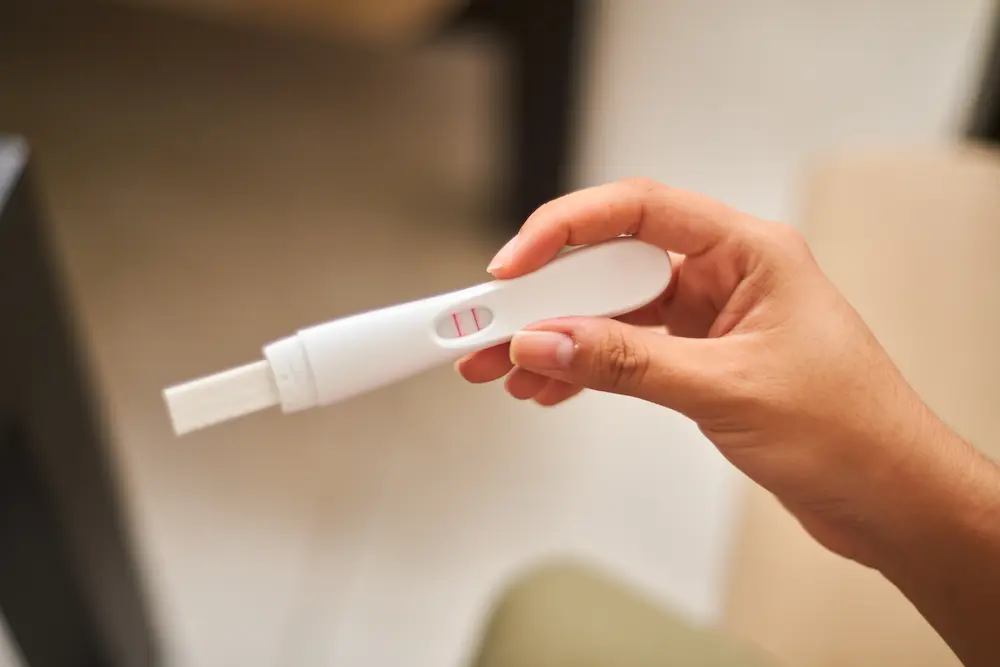
Nausea, fatigue, and/or a missed period… These may be the first signs of pregnancy. To be sure, you’ll likely head to a pharmacy to get a pregnancy test. When should you take a pregnancy test? How should you interpret the results?
Reliable pregnancy test: here’s what you need to know.
The different types of pregnancy tests
There are mainly two types of pregnancy tests considered reliable: urine tests and blood tests.
Urine tests
Urine pregnancy tests are the most commonly used due to their accessibility and ease of use. It’s probably the stick you urinate on that comes to mind when you hear the words “pregnancy test.” These tests work by detecting the presence of the beta-hCG hormone (human chorionic gonadotropin) in urine, secreted by the body as soon as the egg implants in the uterus.
Blood tests
It’s also possible to take a blood test, which is even more accurate than urine tests because the measurements are taken directly from the blood and interpreted by your doctor or midwife, which reduces the risk of false positives or false negatives. The same hormone, beta-hCG, is measured—just in the blood this time.
Good to know: in France, blood tests can be reimbursed by health insurance when prescribed by a healthcare professional.
Factors affecting test reliability
The reliability of these pregnancy tests can be influenced by several factors. Here are the most common ones.
Pregnancy test: false positives and false negatives
Using a urine pregnancy test is simple, but certain factors can sometimes distort the result, leading to false negatives or false positives. Here are a few examples:
- Incorrect use: not following the instructions for how to expose the test to urine can lead to inaccurate results. Make sure to read and follow the instructions carefully.
- Reading the results: results must be read within the specific time frame indicated in the instructions. Reading too early or too late could give an inaccurate result. Follow the recommended timing for an accurate reading.
- Overly diluted urine: if you’ve had a lot to drink before taking the test, the hCG hormone may be diluted in your urine, affecting test sensitivity. That’s why it’s often recommended to take the test with your first morning urine.
- Expired test: using a test past its expiration date can affect its accuracy. Always check the date before use.
- Testing too early: taking a test before your expected period may not detect the pregnancy hormone if it’s still at a low level.
Test sensitivity
The sensitivity of a urine pregnancy test is also important to consider. Some tests are designed to detect the beta-hCG hormone earlier than others. So, ask your pharmacist for advice to choose the most suitable test for your situation.
Overall, the urine tests available today have very high sensitivity (around 99%), which means a positive urine test is 99% reliable (false positives are rare). However, the specificity is slightly lower: a negative test does not necessarily mean you aren’t pregnant. False negatives are most often caused by incorrect use of the test, as mentioned above.
Good to know: a blood test can generally detect lower levels of beta-hCG than urine tests, making it more reliable for early confirmation of pregnancy.
Also note that a pregnancy test can be positive even if the pregnancy is no longer developing (spontaneous miscarriage) or cannot develop properly (ectopic pregnancy).
Want to learn more? Feel free to download the May app, where you’ll find plenty of resources to support and guide you throughout your pregnancy.

When to take a pregnancy test?
A reliable pregnancy test also depends on the timing of use. Here are some tips for choosing the right moment:
- Urine test: it’s generally recommended to take a urine test from the first day of a missed period, or a few days later. This ensures the pregnancy hormone is present in sufficient quantity to be detected. Testing too early, before a missed period, can lead to a false negative.
- Blood test: a blood test can detect very low levels of beta-hCG, as early as the sixth day after fertilization or the tenth day after ovulation. This test is particularly useful for confirming pregnancy at an early stage.
Good to know: if you experience symptoms such as nausea, fatigue, or other body changes but the urine test is negative, we recommend consulting your doctor for a blood test, which will be more accurate. 
How to read pregnancy test results?
Depending on the type of urine test, the result may appear in different ways. Refer to the instructions for your test to understand how to interpret the result.
- If the test is positive: you may see two lines, a “+”, or the word “pregnant,” sometimes with an estimated number of weeks.
- If the test is negative: you may see one line, a “-”, or the words “not pregnant.”
For a blood test, a positive beta-hCG level confirms pregnancy.
Good to know: the beta-hCG level alone cannot reliably determine the number of weeks or the exact start date of pregnancy.

What to do if the result is unclear?
When taken at the wrong time or incorrectly, the result of an otherwise reliable pregnancy test may be uncertain.
In that case, we recommend that you:
- Retake the test: if the result is negative but your period is still late, take another test a few days later. You may have tested too early the first time.
- Consult a healthcare professional: if you’re still unsure after a urine test, a blood test can be prescribed to clarify the result.
- Monitor your symptoms: if you notice pregnancy symptoms despite a negative result, we recommend consulting a healthcare professional to confirm or rule out pregnancy, or identify any underlying cause.

Positive pregnancy test: what to do next?
Your test is positive—if you’ve been trying for a baby, congratulations! You’re probably wondering what the next steps are.
If you’re relying on a urine test, the first step is to see your doctor or midwife to confirm the results with a blood test if necessary. If your pregnancy is confirmed, your first prenatal appointment should take place during the first trimester (the earlier, the better!). An early ultrasound can be performed around 7–8 weeks of amenorrhea but isn’t mandatory. The first-trimester ultrasound is recommended around 12 weeks of gestation to check that the pregnancy is progressing well, confirm the number of embryos, and determine the gestational age.
It’s also a good time to think about the practical and medical aspects of pregnancy. Here are a few points to consider:
- Diet and lifestyle: aim for a balanced diet and avoid alcohol, tobacco, and drug use (seek help if needed).
- Medical follow-up: schedule regular appointments with your doctor or midwife to prescribe the right supplements (folic acid is very important in the first trimester!), monitor your pregnancy, and answer any questions.
Of course, your healthcare provider is there to answer all your questions and guide you through this new chapter of your life.
Good to know: if you don’t wish to continue the pregnancy, your doctor can also explain the different options available to you in that situation.
There are therefore two types of reliable pregnancy tests: urine tests and blood tests. The reliability of a urine test mainly depends on proper use and timing. The blood test, on the other hand, is even more accurate. In any case, if you have doubts or questions, don’t hesitate to contact your healthcare professional.

**
Photos: AnnaStills | gpointstudio | YuriArcursPeopleimages | Prostock-studio | FabianMontano | monkeybusiness
This text was translated from French by an artificial intelligence. The information, advice, and sources it contains comply with French standards and may therefore not apply to your situation. Make sure to complement this reading by visiting the May US/UK app and consulting the healthcare professionals who are supporting you.




